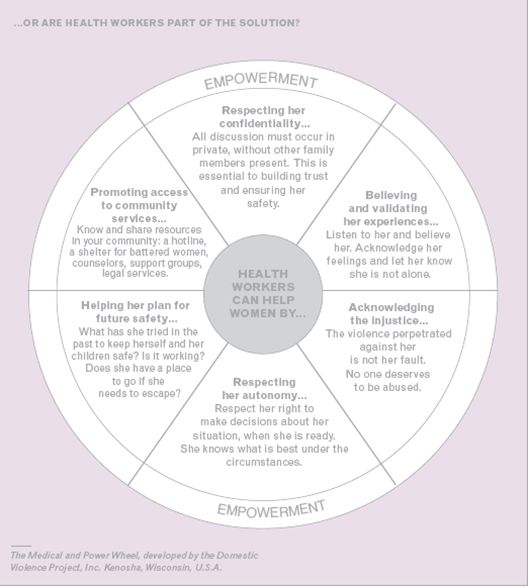- Service quality can be defined in terms of the different dimensions outlined below, each of which is dependent on the other in order to realize overall quality of care. The priority is always to promote the health and well-being of survivors.
|
Equity |
Equity along several dimensions needs to be considered in service planning. Geographical equity can be achieved by ensuring that plans are developed to improve sexual assault health services progressively throughout the country. Services need to be equitably available to different groups in society, and in particular marginalized groups, who are often at particular risk of sexual assault, such as those engaged in sex work or drug users, need to be able to have their health needs met without fear of experiencing penalties. Equity also demands that services are provided to those in institutions as well as the general population.
|
|
Effective-ness |
Effective health services meet the health and welfare needs of survivors of recent and past sexual violence. Effective services need to be well managed and provide care of a high clinical standard.
|
|
Efficiency |
Efficient services are those that meet the needs of survivors promptly and effectively. The greatest threat to health service efficiency in most countries is low quality of clinical care resulting in a failure to treat sexually transmitted diseases, prevent pregnancy, meet mental health needs and provide information that can be used persuasively in court. Monitoring and evaluation of health services are key tools in ensuring and building quality of care and ensuring efficiency. Legal and health outcomes can be monitored and the organisation and activities scrutinised in order to ensure that these are optimised. Victim/survivors have a critical role in service evaluation, as described further in the Monitoring and Evaluation section. |
|
Access |
In every country where it has been examined, research has shown that the majority of people who are sexually assaulted do not currently come forward to the police. Public perceptions of health services available to sexual assault victims/survivors are crucial in promoting access to health care. It is very important that health services enable health needs to be met without mandatory police reporting and involvement in cases. Involving courts or the police should be the woman’s decision, based on full information on the implications of taking such steps.
Geography is important in access, and services need to be planned so that they can be reached by all within an acceptable travelling time, and at an acceptable transport (or other) cost. If it is possible there should not be user fees for these services as they will pose a barrier to seeking health care and gaining access to justice. Services also need to be available 24 hours a day, seven days a week, and survivors should be able to access same-sex health-care providers.
|
|
Appro-priateness and Accepta-bility |
Appropriate services are based on the recognition that survivors need special consideration paid to them, and that health services need to ensure that, as far as possible, health care seeking does not further stress survivors, but rather is seen as a step in regaining control over their lives. Protocols for providing care should be developed such that the number of examinations and interviews victim/survivors have to undergo is kept to a minimum, preferably one at the health facility. High quality health care needs to be coordinated such as to link the provision of immediate medical care, forensic examinations, crisis and short term counselling, follow up medical care and advocacy. This is best achieved in a dedicated service with clear lines of management. |
|
Choice |
Choice is a very important element in high quality sexual assault health services and lies at the heart of respect for differences between people in their preferences, needs and wants. Where it is possible, survivors should be able to choose which health facility they get their care from. High quality care should be sensitively provided and individualised. Thus victim/survivors should be taken through each stage of their health care and examination separately and have choices about the services they receive, with informed consent sought at each stage. |
Excerpted/Adapted from Jewkes, R., 2006. Paper for Policy Guidance: Strengthening the Health sector Response to Sexual Violence (Unpublished), based on Maxwell R.J., 1992. Dimensions of quality revisited: from thought to action. Quality in Health Care, pp. 171-177.


